八年级英语下册期中复习参考资料
八年级英语下学期期中复习(精选2篇)
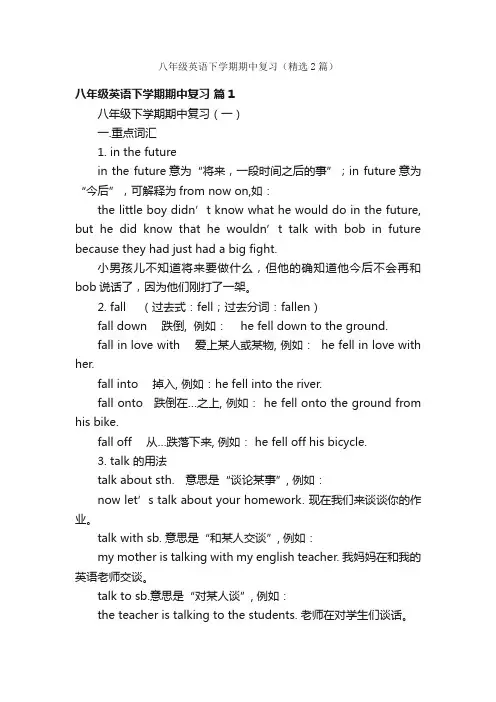
八年级英语下学期期中复习(精选2篇)八年级英语下学期期中复习篇1八年级下学期期中复习(一)一.重点词汇1. in the futurein the future意为“将来,一段时间之后的事”;in future意为“今后”,可解释为from now on,如:the little boy didn’t know what he would do in the future, but he did know that he wouldn’t talk with bob in future because they had just had a big fight.小男孩儿不知道将来要做什么,但他的确知道他今后不会再和bob说话了,因为他们刚打了一架。
2. fall (过去式:fell;过去分词:fallen)fall down 跌倒, 例如: he fell down to the ground.fall in love with 爱上某人或某物, 例如: he fell in love with her.fall into 掉入, 例如:he fell into the river.fall onto 跌倒在…之上, 例如: he fell onto the ground from his bike.fall off 从…跌落下来, 例如: he fell off his bicycle.3. talk 的用法talk about sth. 意思是“谈论某事”, 例如:now let’s talk about your homework. 现在我们来谈谈你的作业。
talk with sb. 意思是“和某人交谈”, 例如:my mother is talking with my english teacher. 我妈妈在和我的英语老师交谈。
talk to sb.意思是“对某人谈”, 例如:the teacher is talking to the students. 老师在对学生们谈话。
初二英语下册期中复习资料
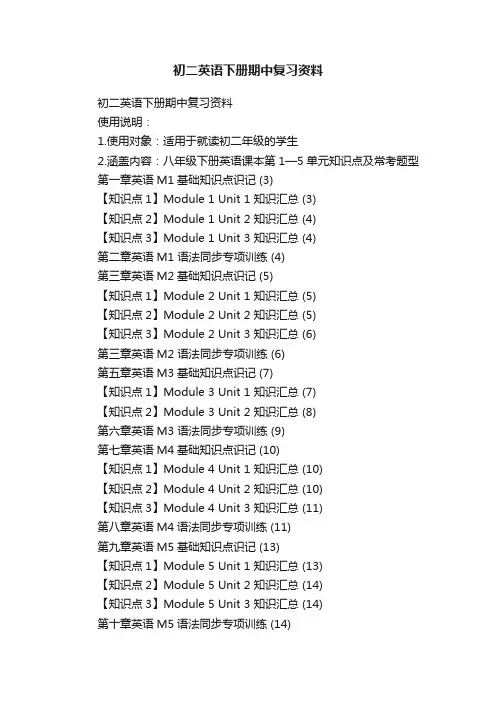
初二英语下册期中复习资料初二英语下册期中复习资料使用说明:1.使用对象:适用于就读初二年级的学生2.涵盖内容:八年级下册英语课本第1—5单元知识点及常考题型第一章英语M1基础知识点识记 (3)【知识点1】Module 1 Unit 1 知识汇总 (3)【知识点2】Module 1 Unit 2 知识汇总 (4)【知识点3】Module 1 Unit 3 知识汇总 (4)第二章英语M1 语法同步专项训练 (4)第三章英语M2基础知识点识记 (5)【知识点1】Module 2 Unit 1 知识汇总 (5)【知识点2】Module 2 Unit 2 知识汇总 (5)【知识点3】Module 2 Unit 3 知识汇总 (6)第三章英语M2 语法同步专项训练 (6)第五章英语M3基础知识点识记 (7)【知识点1】Module 3 Unit 1 知识汇总 (7)【知识点2】Module 3 Unit 2 知识汇总 (8)第六章英语M3 语法同步专项训练 (9)第七章英语M4基础知识点识记 (10)【知识点1】Module 4 Unit 1 知识汇总 (10)【知识点2】Module 4 Unit 2 知识汇总 (10)【知识点3】Module 4 Unit 3 知识汇总 (11)第八章英语M4语法同步专项训练 (11)第九章英语M5基础知识点识记 (13)【知识点1】Module 5 Unit 1 知识汇总 (13)【知识点2】Module 5 Unit 2 知识汇总 (14)【知识点3】Module 5 Unit 3 知识汇总 (14)第十章英语M5语法同步专项训练 (14)第一章英语M1基础知识点识记【知识点1】Module 1 Unit 1 知识汇总1. smell【用法】v. 闻.来,感.动.,.当.动.,后跟形容词,无进行时态和被动语态。
【拓展】其.的.官.词.有:look看.来,taste 尝.来,feel 摸.来,sound 听.来2. What a delicious smell!【用法】感叹句语法一、感叹句用法:表示说话人的强烈的感情。
初二下册英语期中知识点归纳
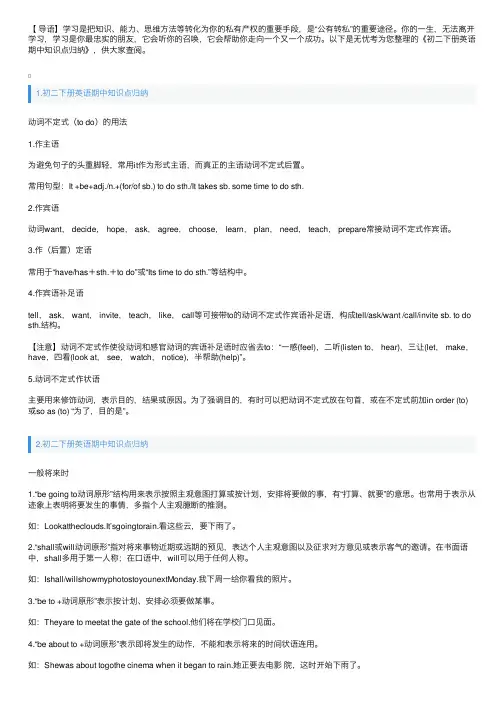
【导语】学习是把知识、能⼒、思维⽅法等转化为你的私有产权的重要⼿段,是“公有转私”的重要途径。
你的⼀⽣,⽆法离开学习,学习是你最忠实的朋友,它会听你的召唤,它会帮助你⾛向⼀个⼜⼀个成功。
以下是⽆忧考为您整理的《初⼆下册英语期中知识点归纳》,供⼤家查阅。
1.初⼆下册英语期中知识点归纳动词不定式(to do)的⽤法1.作主语为避免句⼦的头重脚轻,常⽤it作为形式主语,⽽真正的主语动词不定式后置。
常⽤句型:It +be+adj./n.+(for/of sb.) to do sth./It takes sb. some time to do sth.2.作宾语动词want, decide, hope, ask, agree, choose, learn, plan, need, teach, prepare常接动词不定式作宾语。
3.作(后置)定语常⽤于“have/has+sth.+to do”或“Its time to do sth.”等结构中。
4.作宾语补⾜语tell, ask, want, invite, teach, like, call等可接带to的动词不定式作宾语补⾜语,构成tell/ask/want /call/invite sb. to do sth.结构。
【注意】动词不定式作使役动词和感官动词的宾语补⾜语时应省去to:“⼀感(feel),⼆听(listen to, hear),三让(let, make,have,四看(look at, see, watch, notice),半帮助(help)”。
5.动词不定式作状语主要⽤来修饰动词,表⽰⽬的,结果或原因。
为了强调⽬的,有时可以把动词不定式放在句⾸,或在不定式前加in order (to)或so as (to) “为了,⽬的是”。
2.初⼆下册英语期中知识点归纳⼀般将来时1.“be going to动词原形”结构⽤来表⽰按照主观意图打算或按计划,安排将要做的事,有“打算、就要”的意思。
新版新目标八年级英语下册期中考试作文复习资料
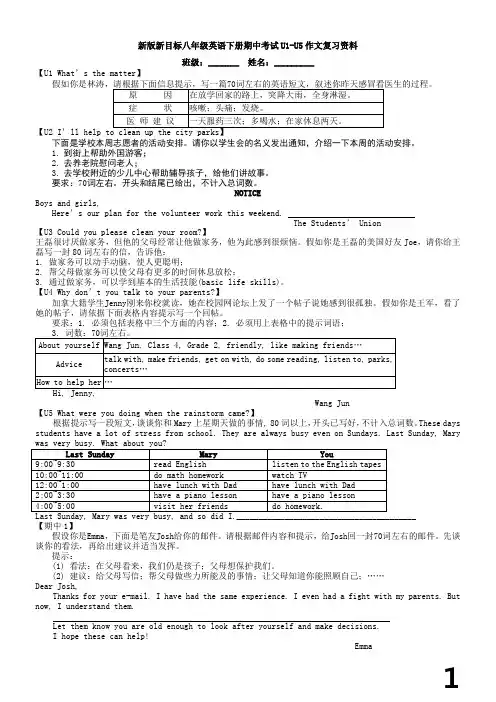
新版新目标八年级英语下册期中考试U1-U5作文复习资料班级:_______ 姓名:_________【U1 What’s the matter】【U2 I’ll下面是学校本周志愿者的活动安排。
请你以学生会的名义发出通知,介绍一下本周的活动安排。
1. 到街上帮助外国游客;2. 去养老院慰问老人;3. 去学校附近的少儿中心帮助辅导孩子,给他们讲故事。
要求:70词左右。
开头和结尾已给出,不计入总词数。
NOTICEBoys and girls,Here’s our plan for the volunteer work this weekend.The Students’ Union【U3 Could you please clean your room?】王磊很讨厌做家务,但他的父母经常让他做家务,他为此感到很烦恼。
假如你是王磊的美国好友Joe,请你给王磊写一封80词左右的信,告诉他:1. 做家务可以动手动脑,使人更聪明;2. 帮父母做家务可以使父母有更多的时间休息放松;3. 通过做家务,可以学到基本的生活技能(basic life skills)。
【U4 Why don’t you talk to your parents?】加拿大籍学生Jenny刚来你校就读,她在校园网论坛上发了一个帖子说她感到很孤独。
假如你是王军,看了她的帖子,请依据下面表格内容提示写一个回帖。
要求:1. 必须包括表格中三个方面的内容;2. 必须用上表格中的提示词语;Wang Jun【U5 What were you doing when the rainstorm came?】根据提示写一段短文,谈谈你和Mary上星期天做的事情, 80词以上,开头已写好,不计入总词数。
These days students have a lot of stress from school. They are always busy even on Sundays. Last Sunday, Mary【期中1】假设你是Emma,下面是笔友Josh给你的邮件。
八年级下册英语期中考试复习知识点梳理
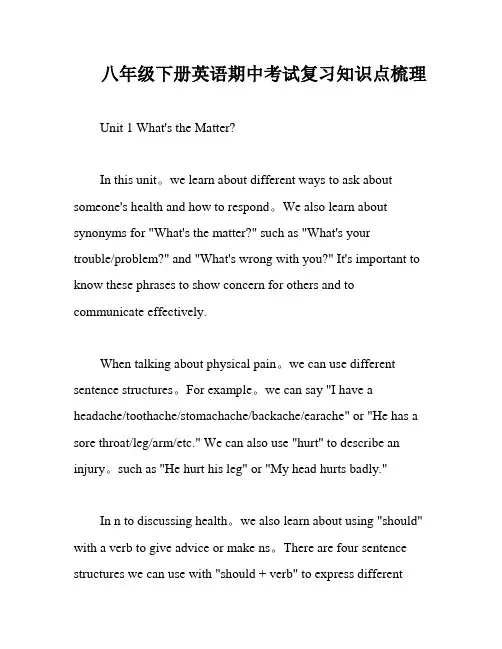
八年级下册英语期中考试复习知识点梳理Unit 1 What's the Matter?In this unit。
we learn about different ways to ask about someone's health and how to respond。
We also learn about synonyms for "What's the matter?" such as "What's yourtrouble/problem?" and "What's wrong with you?" It's important to know these phrases to show concern for others and to communicate effectively.When talking about physical pain。
we can use different sentence structures。
For example。
we can say "I have a headache/toothache/stomachache/backache/earache" or "He has a sore throat/leg/arm/etc." We can also use "hurt" to describe an injury。
such as "He hurt his leg" or "My head hurts badly."In n to discussing health。
we also learn about using "should" with a verb to give advice or make ns。
人教版八年级下册英语期中复习资料范文.doc
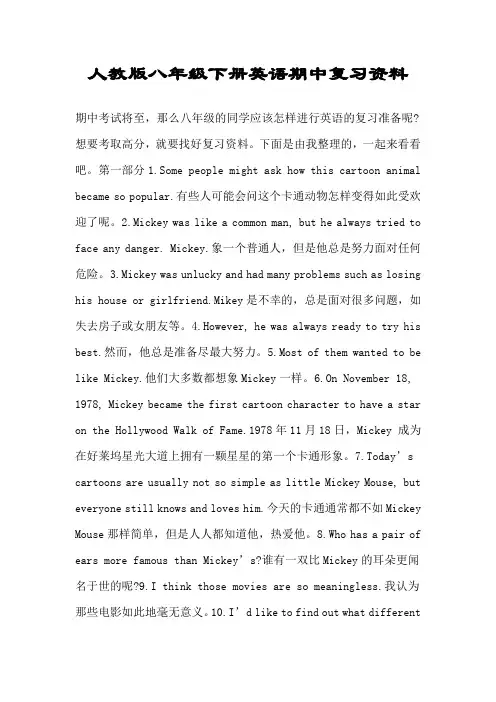
人教版八年级下册英语期中复习资料期中考试将至,那么八年级的同学应该怎样进行英语的复习准备呢?想要考取高分,就要找好复习资料。
下面是由我整理的,一起来看看吧。
第一部分1.Some people might ask how this cartoon animal became so popular.有些人可能会问这个卡通动物怎样变得如此受欢迎了呢。
2.Mickey was like a common man, but he always tried to face any danger. Mickey.象一个普通人,但是他总是努力面对任何危险。
3.Mickey was unlucky and had many problems such as losing his house or girlfriend.Mikey是不幸的,总是面对很多问题,如失去房子或女朋友等。
4.However, he was always ready to try his best.然而,他总是准备尽最大努力。
5.Most of them wanted to be like Mickey.他们大多数都想象Mickey一样。
6.On November 18, 1978, Mickey became the first cartoon character to have a star on the Hollywood Walk of Fame.1978年11月18日,Mickey 成为在好莱坞星光大道上拥有一颗星星的第一个卡通形象。
7.Today’s cartoons are usually not so simple as little Mickey Mouse, but everyone still knows and loves him.今天的卡通通常都不如Mickey Mouse那样简单,但是人人都知道他,热爱他。
8.Who has a pair of ears more famous than Mickey’s?谁有一双比Mickey的耳朵更闻名于世的呢?9.I think those movies are so meaningless.我认为那些电影如此地毫无意义。
Units1-4期中复习--词汇运用+2022-2023学年牛津深圳版 八年级英语下册【附答案】
深圳牛津八年级下册期中复习U1-4词汇运用U1 Help those in needⅠ. 根据要求写出相应单词1. permit(名词)____________2. serious(副词)____________3. illness(形容词)____________4. organize(名词)____________5. express(名词)____________6. pain(形容词)____________7. difficult(名词) ____________ 8. joy(形容词)____________Ⅱ. 用所给词的适当形式填空1. friendship1)I have a close ____________ with my aunt.2)Mary and I have been ____________ since we met each other at the first time.3)Mr. Li is always ____________ to us.2. disabled1)We should help the ____________ people.2)He was not ____________ to go home tonight.3. serious1)Luckily, the accident was not ____________.2)—Is she ____________ ill at present? —Yes. The doctor says that they will try to save her life.4. courage1)Tom has enough _________ to overcome the illness.2)Our Maths teacher often _______ us to study harder.5. lonely/alone1)Little Steven was unhappy and ____________ because he had no friends to play with.2)Grandparent lives ____________ in the countryside, but he isn’t _________ because he has three dogs.Ⅲ. 用所给中文或所给词的适当形式填空1. My parents didn’t understand my ____________(苦恼).2. We need to help children like Tim and raise their ____________(情绪).3. Disabled children have ____________(困难)____________(walk)or moving.4. I didn’t tell Bessy the truth because I was afraid of ____________(受伤)Bessy’s feelings.5. It’s easy for us to help the old people in our ____________(社区).6. Mary didn’t come to school because of her ____________(ill).7. I taught them to sing because music can bring them joy and ____________(peaceful).8. You must ask ____________(permit)if you want to leave early.9. I don’t know how ____________(expression)my thanks.10. He lost his arms in a car accident and became ____________(able).U2 Body languageⅠ. 根据要求写出相应单词1. communicate(名词) ____________2. meaning(动词) ____________3. express(名词) ____________4. appearance(动词)____________5. hold(过去式) ____________6. lady(复数) ____________7. impress(名词) ____________ 8. shake(过去式) ____________Ⅱ. 用所给词的适当形式填空1. impression1)What is your first ____________ on Jenny?2)The days to the mountain was ____________ and happy.2. cross/across/through1)It’s very dangerous for children to ________ the busy street.2)They ran ____________ the road quickly.3)She smiled at him as he walked ____________ the door.3. appearance1)We can’t judge(判断)a person by his ____________.2)My keys ____________ again. So I can’t enter my room.4. express1)Everyone should learn to ____________ his feeling.2)Mary looked at me with a very strange ____________.5. mean1)Tom, do you know what does that word ____________?2)I don’t know the ____________ of the word.Ⅲ. 用所给词的适当形式填空1. Do you make ____________(确信)that he came to help me learn English.2. Now most college students have ____________(兼职的)jobs in companies.3. It was really a ____________(厌倦的)film. I almost fell asleep.4. Our ____________(交流)made us spend a happy time.5. Tom ____________(叹息)and said he failed the exam.6. They will give training classes to these new ____________(lady).7. Debbie is ____________(hold)her head up.8. Few minutes ____________(late), she worked out the question.9. Her ____________(appear)always makes me excited.10. She ____________(nod)to us as she walked by.U3 Traditional skillsⅠ. 根据要求写出相应单词1. describe(名词) ____________2. fisherman(复数) ____________3. attract(名词) ____________4. attract(形容词) ____________5. hang(过去分词) ____________6. healthy(名词) ____________7. traditional(名词) ____________8. simple(副词) ____________ Ⅱ. 用所给词的适当形式填空1. fisherman1)Many ____________ said they don’t catch fish by traditional skills any more.2)We caught two huge ____________ in the lake.2. fit1)The suit ____________ you well, Sue.2)More and more people want to keep ____________ now.3. practise1)David and Jason ____________ as doctors since five years ago.2)Vivian ____________ ____________(run)every day.3)____________ makes perfect.4. describe1)The police asked her ____________ the man.2)He gave a ____________ of what he had seen.5. luck1)We are ____________ enough to pass the exam.2)Good ____________ to you!3)____________, we all passed the exam.Ⅲ. 用所给词的适当形式填空1. What ____________(图案)are used in paper cutting?2. What a sad _____________(人物)that Nigel is!3. This jacket is just my ____________(大小).4. She looked particularly ____________(迷人的)that night.5. Try to express yourself more _____________(简单的)and clearly.6. Look! A man is _____________(tie)a boat to a small tree over there.7. Damin usually _____________(set)off in the late afternoon and gets the cormorants ready for work.8. What did they do to _____________(attraction)the people’s attention?9. I need some ____________(tool), including a pair of scissors and some forks.10. If you want to be a good speaker, you should practise _____________(read)every day.U4 Cartoons and Comic StripsⅠ. 根据要求写出相应单词1. think(名词) ____________2. basic(名词) ____________3. pleasant(名词) ____________4. affect(名词) ____________5. detail(形容词) ____________6. act(名词) ____________7. appear(反义词) ____________ 8. warn(名词) ____________Ⅱ. 用所给词的适当形式填空1. act1)Richard ____________ as a teacher in a middle school last year.2)Lily’s dream is to be an ____________(act)in the future.3)Yang yang is a popular ____________ in China.2. pleasant。
八年级下册英语期中考试复习知识点梳理
八年级下册英语期中考试复习知识点梳理八下中考Unit 1-6知识梳理Unit 1 What's the matter?【语法】同义句问:XXX (with sb.)?=What’s your trouble/ matter/ problem?= What’s up? = What happens to sb.?(某人)出什么事了?=What’s wrong (with sb.)?(某人)怎么了?=Are you OK?你没事吧?=XXX?某人有什么事吗?【辨析】trouble【麻烦:make trouble】; matter【事情】;problem【难度大:solve problem】; question【难度小:ask/ answer question】答:①某人XXX.某人+have/has+a+sore+发病部位.XXX.他喉咙痛。
③某人+hurt(s)+身体部位或反身代词.XXX his XXX.他的腿受伤了。
④某部位+hurt(s).My head hurts badly.我头痛得锋利。
⑤某人+have/has+a pain+in one’s+身体部位,I have a XXX.我胸口痛。
【语法】should +动原【四个句型】【重点词汇掌握】(1)too用于一定句,句末,有逗号离隔;句中,前后都加逗号。
(2)also句中,be等助动词后,实义动词前。
(3)either用于否认句,句末,并用逗号离隔(4)neither作代词“两者都不”He is not there, _______.他也不在那儿。
She _______XXX.她也学英语。
He likes English,______.她也喜欢英语。
You may use _____book.两本书你可以随便用一本。
______answer is wrong.两个答案都不对。
I don’t like him. ______ do I.我不喜欢他。
八年级英语下期中复习资料大全
◆unit 1 Will people have robots?知识点:1.形容词,副词的比较等级考查热点透视:a)表示A与B在程度上相同时,“as+形容词或副词的原级+as”结构。
表示A不如B 时,可用“not as/so+形容词或副词的原级+as”结构。
b)表示A比B在程度上“更…..”时,可用“形容词或副词的比较级+than”结构c)表示三者或三者以上的比较,其中一个在程度上“最…..”时,常用“the+形容词或副词的最高级”结构,后面可带“of/in的短语”来说明比较的范围。
(注意:副词的最高级在句中常省略“the”.)d)在形容词或副词的比较级前,可以用“a little, even, far, much,still”的等词语来修饰,以加强语气。
e)表示“越来越….”时,常用“形容词或副词的比较级+and+形容词或副词的比较级”结构,但要注意,对于多音节和部分双音节形容词,副词而言,若要表达此意时,要用“more and more+形容词或副词的原级“结构。
f)在表示“其中最….之一“的含义时,常使用“one of+the+形容词最高级形式+名词复数”结构,其中的定冠词the不可以省略。
g)如果强调“两者中比较…的(一个)”的意思时,可使用“the+形容词比较级+其它”结构。
h)表示“越….越….”, 可使用“the+形容词或副词的比较级,the+形容词或副词的比较级”结构。
2 .一般将来时a)一般将来时的构成:由助动词shall或will加动词原形构成,shall用于第一人称。
在口语中,will在名词或代词后常简略为’ll,will not常简略为won’t。
这个时态的肯定,否定和疑问结构可表示如下:用b)一般将来时的用法:1)表示将要发生的动作或情况;2)不以人的意志为转移,肯定要发生的事情。
The day after tomorrow will be National Day.后天是国庆日。
人教版八年级下册英语期中复习知识点总结
人教版八年级下册英语期中复习知识点总结人教版八年级下册英语期中复知识点总结Unit 1. What’s the matter?重点短语归纳1. foot---XXX脚<复> XXX---XXX牙齿<复>2. have a cold感冒3. XXX胃疼4. have a sore back背疼5. XXX喉咙疼6. have XXX发烧7. lie down and (have a)rest躺下休息have a rest休息8. XXX加蜜的热茶9. see a dentist看牙医XXX看医生10.drink lots of water多喝水11.lots of ,a lot of, a lota lot of=lots of,可以修饰可数名词复数和不可数名词,一般用在肯定句中。
:There are lots of(a lot of)books in our library.There is a lot of water on the grounda lot,是一个副词词组,跟动词连用;表示十分,很等意思;Thanks a lot.12. have a toothache牙疼13. That’s a good idea好主见14. go to bed去睡觉go to bed early早上床睡觉15. feel well感触好feel ill感触不惬意XXX I’XXX well我觉得不惬意.16. start doing/ to do sth开始做某事17. two days ago两天前18. get some rest多苏息,苏息一会儿19. I think so我认为是这样20. be XXX口渴21. be hungry饥饿22. be stressed out紧张23. listen to music听音乐24. XXX健康的生活方式25. traditional Chinese doctors传统中医26. need to do sth需要做某事I have a toothache. I need to see a dentist.我牙痛,我需求去看牙医.We need to keep our classroom clean.我们需求坚持课堂的干净.27. a balance of yin and yang阴阳均衡28. for example例如29. too much XXX太多的阴,阴气太盛too much +不成数名词太多的…much too +形/副实在太…极其,非常too many +可数名词复数太多的…30.XXX对甚么有益,对甚么有优点be bad XXX对甚么有害be good to对…好be good at =do well in在……方面好,擅长be good(bad) for、be good at的相干用法Li Ping is good at XXX.XXX善于于篮球。
- 1、下载文档前请自行甄别文档内容的完整性,平台不提供额外的编辑、内容补充、找答案等附加服务。
- 2、"仅部分预览"的文档,不可在线预览部分如存在完整性等问题,可反馈申请退款(可完整预览的文档不适用该条件!)。
- 3、如文档侵犯您的权益,请联系客服反馈,我们会尽快为您处理(人工客服工作时间:9:00-18:30)。
八年级英语下册期中复习一.重点词汇1. in the futurein the future意为“将来,一段时间之后的事”;in future意为“今后”,可解释为from now on,如:The little boy didn’t know what he would do in the future, but he did know that he wouldn’t talk with Bob in future because they had just had a big fight.小男孩儿不知道将来要做什么,但他的确知道他今后不会再和Bob说话了,因为他们刚打了一架。
2. fall(过去式:fell;过去分词:fallen)fall down跌倒, 例如:He fell down to the ground.fall in love with爱上某人或某物, 例如:He fell in love with her.fall into 掉入, 例如:He fell into the river.fall onto跌倒在…之上, 例如:He fell onto the ground from his bike.fall off从…跌落下来, 例如:He fell off his bicycle.3. talk 的用法talk about sth.意思是“谈论某事”, 例如:Now let’s talk about your homework. 现在我们来谈谈你的作业。
talk with sb. 意思是“和某人交谈”, 例如:My mother is talking with my English teacher. 我妈妈在和我的英语老师交谈。
talk to sb.意思是“对某人谈”, 例如:The teacher is talking to the students. 老师在对学生们谈话。
talk over sth.作“讨论某事”解,宾语是代词时须位于副词over之前, 例如:They talked over the matter at table.他们吃饭时讨论了这个问题。
give a talk意思是“作一个报告”注意要表示“告诉某人某事”时,须用tell sb. about sth.这样的结构。
4. argue with sb和discussargue 重在就自己的看法、立场提出论证说理,以说服他人。
而discuss 重在交换意见,进行讨论,不含有意说服对方的成分, 如:I argued with him for a long time,but he refused to listen to reason.我和他辩论了好久,但他拒不服理。
The women were discussing hats. 女人们在谈论帽子。
argue的常见搭配有:argue on / about sth. 就…进行辩论argue with sb.about sth.就某事与某人一起辩论5. enough “足够的,充足的”enough作为形容词放在名词之前,起修饰名词作用,作为副词修饰形容词或副词放置其后,常用于:be+ adj.+enough to do sth.的句型,意为“足以能……”,如:She has drunk enough water/water enough. 她已经喝了足够的水。
I'm strong enough for this work. 我够强壮,足以能胜任这项工作。
The boy is not old enough to go to school. 这孩子不够上学的年龄。
He rans fast enough. No one can catch up with him. 跑得足够的快。
没人能赶得上他。
另外,enough前除可用quite外,一般不用修饰;enough作名词用时,表示“足够,充足”,如:The man never has enough. 这个人永远不知足。
I've had enough,thank you. 我吃饱了,谢谢。
6. find, find out和look forfind表示“找到,认为,觉得”,强调动作的结果。
常指找到丢失或忘掉的东西,如:Jim couldn’t find his hat.吉姆找不着帽子了。
I can't find my book.我找不到我的书。
look for意为“找,寻找”是持续性动词,强调动作,不表示结果,如:She is looking for her son.她正在找她的儿子。
I’m looking for my watch. 我正在寻找我的手表。
比较:He can’t find his pen.他找不到他的钢笔了。
--- What are you looking for? 你在干什么?--- I’m looking for my maths book. Ican’t find it. 我正找我的数学书,我找不到了。
find out作经过打听,询问后搞清楚,弄明白。
或指“查明”的动作,“经过调查”发现,查明真相,如:I can find out the truth of the fact. 我能查出事实的真相。
7. be angry with sb;be angry at sth(1)表示“对某人生气”,可以说be/get/become angry with sb.也可说be/get/become angry at sb.前者更普遍,后者更侧重于:“对某人的言行生气”。
如:Mother got angry at(with)me only because I had broken a precious cup.妈妈对我发火,只是因为我打破了一只贵重的杯子。
I was very(rather)angry at what he said.我对他所说的话非常生气。
(2)表示“因某事生气”,可说be/get/become angry at sth.也可说be/get/become angry aobut sth.如:He was angry at(about)what I said.他对我所说的感到生气。
She was angry at being kept waiting.她因别人让她久候而生气。
8. on the tree和in the tree表示“在树上”既可以用on也可以用in,但用的词不一样,所隐含的意思也就不一样:in the tree通常表示所提物体不是树上长出来的,而是挂在、落在或是停歇在树上,如:The birds are singing in the trees. 鸟在树上唱歌。
The child is staying in the tree. 小孩呆在树上。
on the tree通常表示所提物体是树上长出来的部分,如:They are busy picking the apples on the trees. 他们正忙着摘树上的苹果。
There aren’t many oranges on the tree. 这棵树上桔子不多。
9. the same… as 同……一样的sameadj.同一的,相同的,如:Meet me at the same time tomorrow. 明天的这个时间和我见面。
pron. 同样的事物,如:I would do the same again. 我愿意重做一次。
the same…as 同……一样的,表示与as后的事物很相像,但并不是同一个,如:Your pen is the same as mine. 你的钢笔和我的一样。
the same … that = one and the same 同……一样的,表示与as后的事物完全一致,完全一样,如:He was wearing the same shirt (that) he'd on the day before.他穿的那件衬衫, 是他前一天穿过的同一件衬衫。
I went out the same way (that) l'd got in. 我顺着进来的原路出去了。
10. help with+n. = help sb. (to) do sth. 帮助某人做某事,如:He often helps me with my English.= He often helps me to study English.他经常帮助我学习英语。
11. bored 和boring.bored 表示被动的含义,例如:I feel bored about it. 它使我感到乏味。
boring 表示主动的含义,例如:It is very boring to study English. 学习英语很无聊。
12. surprise 动词“使惊奇”,如:You surprise me! 你吓了我一跳!(1)surprise 还可以作为名词“惊奇,吃惊”;“可惊的事情, 意外的事情”。
作为“令人吃惊的事情,意外的事情”是可数名词,如:What a surprise! 多么令人吃惊的事!Don't tell him about the present — it's a surprise.不要告诉他礼物的事,这是件意想不到的礼物。
(2)surprising 形容词“令人吃惊的”,表示主动的含义,如:They have heard the surprising news. 他们听到了那惊人的消息。
(3)surprised形容词“感到惊讶的”,表示被动的含义,如:I am surprised at you. 我对你的举动感到诧异。
(4)to one's surprise 使某人非常惊奇的是,如:To my surprise,I found him sing well. 使我吃惊的是他歌唱得很好。
二. 重点结构There be 结构变形:在there be结构中还可把be改变从而使得there be结构有了一些改变具体总结如下:1. There used/seem/happen/appear to be,如:There might be snow at night. 晚上可能有雪。
There appeared to be nobody willing to help. 看来没人愿意帮忙。
There used to be a building here. 过去这儿有一座楼房。
There happened to be a man walking by. 碰巧有个人在此经过。
